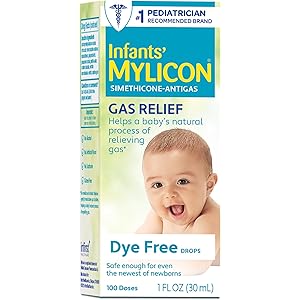MYLICON Infants Gas Relief Drops for Infants and Babies, Dye Free Formula, 1 Fluid Ounce
$9.86 (as of October 25, 2025 00:05 GMT +00:00 - More infoProduct prices and availability are accurate as of the date/time indicated and are subject to change. Any price and availability information displayed on [relevant Amazon Site(s), as applicable] at the time of purchase will apply to the purchase of this product.)What is Newborn Screening?
Newborn screening is a vital public health program that tests infants shortly after birth for certain genetic, metabolic, hormonal, and functional conditions. The primary goal of newborn screening is to identify these conditions early, allowing for timely intervention and treatment to prevent serious health issues or developmental delays. This process typically involves a simple blood test, which is usually performed within the first 24 to 48 hours of life.
The Importance of Early Detection
Early detection through newborn screening can significantly improve health outcomes for affected infants. Many of the conditions screened for are rare but can lead to severe complications if not treated promptly. For instance, conditions like phenylketonuria (PKU) can cause intellectual disabilities if dietary restrictions are not implemented early on. By identifying these conditions at birth, healthcare providers can initiate treatment plans that enhance the child’s quality of life and development.
Common Conditions Screened
Newborn screening programs vary by region, but they typically test for a range of conditions. Commonly screened disorders include congenital hypothyroidism, cystic fibrosis, sickle cell disease, and metabolic disorders such as galactosemia and maple syrup urine disease. Each of these conditions has specific implications for the infant’s health, making early diagnosis crucial for effective management and treatment.
How Newborn Screening Works
The newborn screening process generally begins with a heel prick to collect a few drops of blood from the infant. This blood sample is then sent to a specialized laboratory where it undergoes various tests to detect the presence of specific conditions. In addition to blood tests, some programs may also include hearing tests and pulse oximetry to check for critical congenital heart defects.
Follow-Up Testing and Diagnosis
If a newborn screening test indicates a potential issue, follow-up testing is essential to confirm the diagnosis. Parents are typically contacted by healthcare providers to discuss the results and the next steps. Follow-up tests may involve more specialized blood tests, imaging studies, or referrals to pediatric specialists, depending on the condition suspected.
State and National Programs
In many countries, newborn screening is mandated by law, and each state or region may have its own specific screening panel. In the United States, the Recommended Uniform Screening Panel (RUSP) outlines the conditions that should be screened for at the national level. However, states can add additional tests based on local health needs and resources, leading to variations in screening practices across the country.
Parental Awareness and Education
Educating parents about newborn screening is crucial for ensuring participation and understanding of the process. Healthcare providers often discuss the importance of screening during prenatal visits and immediately after birth. Parents should be informed about what conditions are screened, the implications of the results, and the importance of follow-up care if a condition is detected.
Challenges and Limitations
While newborn screening is a powerful tool for early detection, it is not without challenges. False positives can occur, leading to unnecessary anxiety and additional testing for families. Additionally, some conditions may not be detectable through screening, emphasizing the importance of ongoing monitoring and developmental assessments as the child grows.
The Future of Newborn Screening
Advancements in technology and genetics are paving the way for more comprehensive newborn screening programs. Researchers are exploring the potential for expanded panels that could detect a wider array of conditions, including those that may not currently be included in standard screening. As our understanding of genetics improves, the future of newborn screening looks promising, with the potential to save more lives through early intervention.



